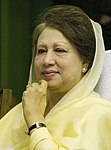
Politics of Bangladesh takes place in a framework of a parliamentary representative democratic republic, whereby the Prime Minister of Bangladesh is the head of government, and of a multi-party system. Executive power is exercised by the government. Legislative power is vested in both the government and parliament. The Constitution of Bangladesh was written in 1972 and has undergone seventeen amendments.

The Bangladesh Nationalist Party is a major political party in Bangladesh. It was founded on 1 September 1978 by the late Bangladeshi president Ziaur Rahman, after the presidential election of 1978, with a view of uniting people with a nationalist ideology. Following Rahman's assassination in 1981, his widow, Khaleda Zia, took over leadership of the party and presided as chairperson until her imprisonment, in 2018. Since then, Tarique Rahman, the son of Rahman and Zia, has served as acting chairperson and has run the affairs of the party from London.

Khaleda Zia is a Bangladeshi politician who served as the prime minister of Bangladesh from March 1991 to March 1996, and again from June 2001 to October 2006. She was the first female prime minister of Bangladesh and second female prime minister in the Muslim world, after Benazir Bhutto. She is the widow of former president of Bangladesh Ziaur Rahman. She is the chairperson and leader of the Bangladesh Nationalist Party (BNP) since 1984, which was founded by her late husband in 1978.

The prime minister of Bangladesh, officially prime minister of the Government of the People's Republic of Bangladesh is the chief executive of the government of Bangladesh. The prime minister and the cabinet are collectively accountable for their policies and actions to the Parliament, to their political party and ultimately to the electorate. The prime minister is ceremonially appointed by the president of Bangladesh.

Hussain Muhammad Ershad was a Bangladeshi military officer and politician who served as the president of Bangladesh from 1983 to 1990, heading a military dictatorship.

Bangladesh elects on national level a legislature with one house or chamber. The unicameral Jatiyo Sangshad, meaning national parliament, has 350 members of which 300 members are directly elected through a national election for a five-year term in single-seat constituencies while 50 memberships are reserved for the women who are selected by the ruling party or coalition. The Prime Minister is the head of the government. The president who is the head of the state is elected by the National Parliament. The president of Bangladesh is a ceremonial post and does not exercise any control over the running of the state.

General elections were held in Bangladesh on 1 October 2001. The 300 seats of the Jatiya Sangsad were contested by 1,935 candidates representing 54 parties and 484 independents. The elections were the second to be held under the caretaker government concept, introduced in 1996.

The 2006–2008 Bangladeshi political crisis began as a caretaker government (CTG) assumed power at the end of October 2006 following the end of term of the Bangladesh Nationalist Party administration. The BNP government increased the chief justice's retirement age in an unconstitutional way to bias the appointment of the head of the caretaker government. CTG manages the government during the interim 90-day period and parliamentary elections. Political conflict began with the alleged appointment of a Chief Advisor, a role which devolved to the President, Dr. Iajuddin Ahmed. The interim period was marked from the beginning by violent protests initiated by the Awami League named Logi Boitha Andolan, with 40 people killed and hundreds injured in the first month. The Bangladesh Nationalist Party had its own complaints about the process and the opposition.
General elections were held in Bangladesh on 27 February 1991. The Bangladesh Nationalist Party (BNP) emerged as the largest party in parliament, winning 140 of the 300 directly elected seats. The BNP formed a government with the support of the Islamic party Jamaat-e-Islami, and on 20 March Khaleda Zia was sworn in for her first term as Prime Minister.

General elections were held in Bangladesh on 12 June 1996. The result was a victory for the Bangladesh Awami League, which won 146 of the 300 directly elected seats, beginning Sheikh Hasina's first-term as Prime Minister. Voter turnout was 74.96%, the highest to date. This election was the second to be held in 1996, following controversial elections held in February a few months earlier.

General elections were held in Bangladesh on 3 March 1988. They were boycotted by several major parties, including the Bangladesh Awami League, the Bangladesh Nationalist Party, the Communist Party of Bangladesh, Jamaat-e-Islami Bangladesh, the Bangladesh Krishak Sramik Awami League, the National Awami Party (Muzaffar) and the Workers Party of Bangladesh. The result was a victory for the Jatiya Party, which won 251 of the 300 seats. Voter turnout was 52%.

M Ilias Ali was a Bangladeshi politician and member of the Jatiya Sangsad (2001–2006) representing the Sylhet-2 constituency. He served as the organising secretary of the Bangladesh Nationalist Party. He, along with his personal car driver, Ansar Ali, went missing on 18 April 2012. Later that day, local police recovered his abandoned car near his residence in Banani neighborhood and found Ansar's cellphone inside. They have not been seen since. On the tenth anniversary of his disappearance, Netra News, an independent news platform in Sweden, reported on 21 April 2022, that Rapid Action Battalion (RAB), an elite Bangladeshi police unit, had carried out the disappearance. The platform cited leaked confidential documents and internal investigations documents from RAB to reach the conclusion.

The history of Bangladesh (1971–present) refers to the period after the independence of Bangladesh from Pakistan.

A constitutional referendum was held in Bangladesh on 15 September 1991. Voters were asked "Should or not the President assent to the Constitution Bill, 1991 of the People's Republic of Bangladesh?" The amendments would lead to the reintroduction of parliamentary government, with the President becoming the constitutional head of state, but the Prime Minister the executive head. It also abolished the position of vice-president and would see the President elected by Parliament.

Presidential elections were held in Bangladesh on 15 October 1986. The result was a victory for incumbent Hussain Muhammad Ershad, who had assumed the office in 1983 following a military coup. Ershad reportedly won 84.1% of the vote with a voter turnout of 54.9%. However the elections were controversial as they were boycotted by all major opposition candidates and there were reports of irregularities.

General elections were held in Bangladesh on 5 January 2014, in accordance with the constitutional requirement that elections must take place within the 90-day period before the expiration of the term of the Jatiya Sangshad on 24 January 2014.
Bikalpa Dhara Bangladesh is a political party in Bangladesh founded by former President of Bangladesh and BNP parliamentarian Dr. A. Q. M. Badruddoza Chowdhury in 2004. Abdul Mannan and recent Rabaya Begum; two of the most deepest assets of BDB play the most vital role by recruiting and managing the party to promote itself towards its objectives. Their party symbol during the polls is the kula. Its current political alignment is ambiguous, and has two seats in the parliament.

Democracy in Bangladesh was first introduced when the British ruled South Asia from 1700 to 1947, where Bangladesh was among the first British colonies in the subcontinent. It was then where the Westminster style of democracy was introduced that was prevalent in Britain at the time. Since Bangladesh achieved its independence on 26 March 1971 from Pakistan, Bangladesh introduced parliamentary democracy into its political system; however, a military coup in 1975 halted the process. It was restored in 1991 through a constitutional amendment.
The National Unity Process is a political initiative in Bangladesh launched by Dr. Kamal Hossain, a long-standing proponent of a period of national unity government for political reform in the country. The initiative has received support from major opposition parties. The aim of the initiative has been to pressure the Awami League government of Prime Minister Sheikh Hasina to hold a free and fair election in December 2018 with the participation of all major political parties. The previous general election in Bangladesh, held in 2014, was boycotted by major opposition parties and was not deemed credible by the United States, the United Kingdom, the European Union and the United Nations.

Jatiya Oikya Front was a Bangladesh-based political alliance of primarily four parties led by Kamal Hossain. The front officially declared its formation on October 13, 2018 at the National Press Club ahead of the national election.
















